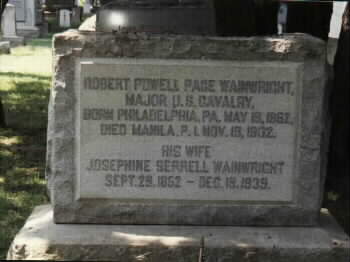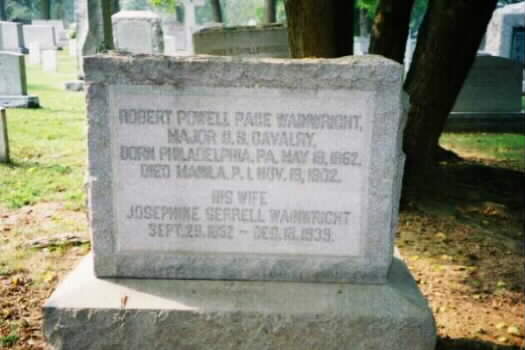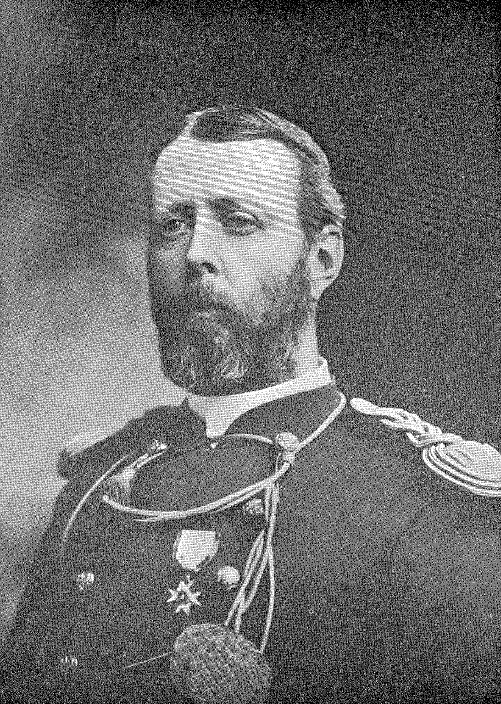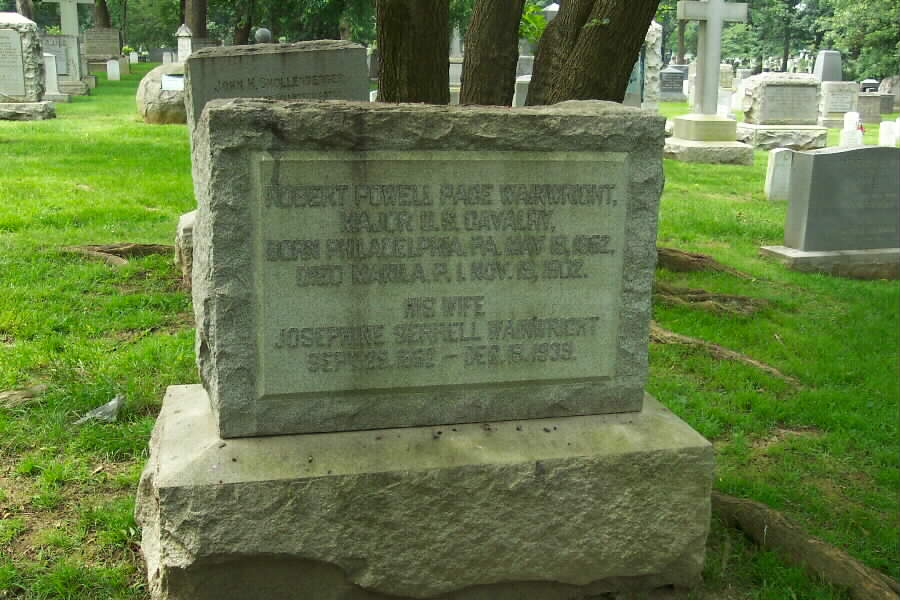Courtesy of Kenneth H. Robinson: Micah John Jenkins Camp No. 164 of the Sons of Spanish American War Veterans, July 2008:
Robert Powell Page Wainwright was born on May 19, 1852, in Philadelphia, the son of Jonathan Mayhew Wainwright and Maria Page. His father was a Commander in the United States Navy during the War of the Rebellion and had been killed in action on January 1st, 1863, at Galveston, Texas, while commanding the U.S.S. Harriet Lane. This was not the last loss to the United States that the family would have to endure, as Robert’s Brother Jonathan Mayhew Wainwright Jr. was killed in action against Pirates on June 19th, 1870, off the western coast of Mexico while serving as an Ensign in the United States Navy aboard the U.S.S. Mohican.
In 1870 young Robert was able to obtain an appointed to the United States Military Academy at West Point, New York, which place he entered as a Cadet on July 1, 1870. He studied his way through the next four years and on June 16, 1875, was graduated 24th in his class from the Military Academy.
Upon graduation he received his appointment as a Second Lieutenant of Cavalry and was assigned to the 1st United States Cavalry Regiment, then serving on frontier duty in the West. As was customary for the time, following graduation, Lieutenant Wainwright was granted a brief furlough, following the conclusion of which he joined the Regiment at Camp Harney, Oregon, on October 15, 1875, and was assigned to Troop K. He would remain on duty with the Regiment at Camp Harney until July 31, 1877, when he served in the Nez Perc Expedition from July to October of 1877, in which Campaign he served as the Adjutant of the Reserve Column. At the close of the Expedition he returned with the Troop to Camp Harney, and would remain there until May of 1878.
From May 30th to September 21st, 1878, he was assigned to duty scouting the country, and as a result was engaged in several skirmishes during this time as part of the Campaign against the Bannock and Ute Indians in Oregon and Idaho. On July 13, 1878, which his Troop he was engaged in the action at the Umatilla Agency in Oregon, during which action he personally led forward his platoon of the Troop in a charge over rough and exposed ground against a large band of Indians at the top of a hill, and which they successfully drove off. Captain Evan Miles of the 21st United States Infantry Regiment would write later that “his excellent services at the battle against the Bannock Pi-Ute Indians near Umatilla Agency, Oregon, on July 13, 1878, is in my report of 1878 to the Commanding General, Department of the Columbia. Lieutenant Wainwright showed conspicuous gall antry in charging and driving the Indians, that largely outnumbered his force, from a strong position on top of a hill.” In February of 1890 for these actions Wainwright was brevetted o the rank of First Lieutenant or his gallantry in the action, even though by that time he had already been promoted to the regular rank of Captain.
Following the conclusion of the Expedition against the Ute Indians, he was assigned to duty at Fort Boise, Idaho, until November 11, 1878, when he was sent to Fort Walla Walla, Washington, until August 23, 1883. On September 2, 1879, Lieutenant Wainwright married Miss Josephine Serrell (Died on December 19th, 1939), the daughter of General Edward W. Serrell, in New York City, New York, while on a leave of absence. Following the conclusion of that leave the young couple returned to the post, and it was there that on February 15, 1881, the couples first child was born, Helen Serrel Wainwright (died on August 9th, 1910), then came Jennie Pound Serrell Wainwright on February 14, 1882 (died in 1939), and finally the third and final child Jonathan Mayhew Wainwright on August 23, 1883, who like his father would graduate from the United States Military Academy at West Point, and would rise to the rank of General in the United States Army.
On June 12th, 1880, Lieutenant Wainwright was promoted to First Lieutenant of Cavalry and remained assigned to the 1st Cavalry Regiment. From October 1, 1883, to March 31, 1884, Lieutenant Wainwright was granted a leave of absence and left the United States for a short time to go to Europe. Upon his return to the United States he rejoined the Troop at Fort Bidwell, California, in March of 1884, and would remain at the post until June 9, 1884, when he was sent to Fort Maginnis, Montana, until September 30, 1886. On October 1, 1886, he was appointed as the Regimental Adjutant of the 1st Cavalry, and joined the Regimental Headquarters, remaining with them until September 30, 1890, when his detail as Adjutant concluded, and 1st Lieutenant Albert L. Mills assuming the duties of that office. On February 4, 1892, Lieutenant Wainwright received his promotion to Captain of Cavalry with the 1st Cavalry Regiment, and assumed command of Troop G, remaining on duty with them at Fort Custer, Montana, to April 20, 1892. From April to June of 1892 he was on duty at Fort Grant, Arizona, and then moved to San Carlos, Arizona, until December of 1892, when they returned to Fort Grant, and would remain there until May of 1895. From May of 1895 to August of 1896 the Troop was stationed at Fort Riley Kansas, and then moved to Fort Sheridan, Illinois, remaining at that post until April 20th, 1898.
On April 20th, 1898, the Regiment was ordered to assemble at Camp George H. Thomas in Chickamauga Park, Georgia, for preparations for service in the War between the United States and Spain. The Regiment moved from Camp George H. Thomas to Lakeland, Florida, in May of 1898, where it was assigned, along with the 1st United States Volunteer Cavalry and the 10th United States Cavalry Regiment’s, to the 2nd Brigade (Brigadier General S.B.M. Young, U.S. Volunteers) of the Cavalry Division (Major General Joseph Wheeler, U.S. Volunteers) of the 5th Army Corps under Major General William R. Shafter, U.S. Volunteers. On June 14, 1898, the Regiment, under the command of Lieutenant Colonel Charles D. Veile, boarded the Transport “Leona,” and prepared to sail with the rest of the fleet and Corps for active service in Cuba. The Transport arrived off of Daiquiri, Cuba, on June 22, 1898, and began landing the Regiment, which moved forward with the rest of the Second Brigade against the Spanish positions. On June 24, 1898, at Las Guasimas the Second Brigade became engaged with Spanish Troops and successfully drove them from the positions. Major James M. Bell commanding the Squadron to which Troop G was attached during the action was wounded, and he was temporarily replaced by Captain Wainwright, who later returned to Troop G after Major Albert G. Forse assumed command of the Squadron. Of his part in the action a fellow officer in the 1st Cavalry would write; “Colonel Roosevelt has given due credit to the Regulars for their part in the action of Las Guasimas. The reports of Generals Young and Wheeler have had wide circulation. * * * Of the conduct of the Regulars in that fight, and of the tactics of Young, I think there is no room for unfavorable criticism, but it is to Wainwright that the greatest credit is due. It was Wainwright’s steady forward movement, straight at the enemy’s most formidable position, that disconcerted the Spaniards, and it is to Wainwright more than any other Regular officer that credit should be given for the brilliant success.” After a short rest from the days fighting the Brigade moved forward with the rest of the 5th Army Corps against the city of Santiago de Cuba, where on July 1, 1898, the 5th Corps would launch assaults against the San Juan Heights and the small town of El Caney. Captain Wainwright with the rest of the Regiment took part in the valiant attack against the San Juan Heights, charging forward alongside of the 1st United States Volunteer Cavalry and the 10th United States Cavalry, during the assault Major Forse commanding the Squadron was killed, and Captain Wainwright once again assumed command of the Squadron leading them throughout the remainder of the engagement, and the ensuing siege of Santiago. For his actions in the Battles of Las Gausimas and Santiago he would be recommended for brevet promotions to Major and Lieutenant Colonel for conspicuous gallantry, however these recommendations were never acted upon.
Following the surrender of the Spanish Forces at Santiago de Cuba on July 17, 1898, the Regiment remained in Cuba until August of 1898 when, with a large portion of the 5th Army Corps, it returned to the United States, going into camp at Camp Wikoff on Montauk Point, Long Island, New York. After a short time in the detention Camp the Regiment was sent to Fort Sheridan, Illinois, where Captain Wainwright would remain on duty until September of 1898. From September 21, 1898, to May 1, 1899, he was on duty as the Chief Mustering Officer for the State of Illinois, and was engaged in the mustering in and out of the United States Volunteers from that State.
Following the end of his duty as Mustering Officer he rejoined the Regiment at Fort Meade, South Dakota, and was again assigned to duty as the Regimental Adjutant on May 29, 1899, and would serve as such until May 29, 1901, when he was relieved by Captain Samuel B. Arnold. In July of 1899 he was detailed to Vancouver, Washington, where he was engaged in purchasing horses to be shipped to the Regiment in the Philippine Islands, until September 10, 1899, when he returned to duty at Fort Meade, however he was once again detailed to purchase horses for the Regiment, and was engaged in this duty from October 15, 1899, to February 6, 1900. From February to July of 1900 he was serving at Chicago, Illinois, on recruiting service, and from July 7 to December 9, 1900, was once again detailed to oversea the purchasing of horses for the Cavalry Service in Oregon, and returning to Recruiting service in Chicago again from December of 1900 to November of 1901.
On May 25th, 1901, after twenty-six years of service with the 1st Cavalry Regiment, Captain Wainwright was promoted to Major of Cavalry and assigned to the 5th Cavalry Regiment. He was relieved from recruiting duty and joined the 5th Cavalry at Fort Duchesne, Utah, and was in command of the Squadron and the Port from November of 1901 to June of 1902, when they were transferred to the Presidio of San Francisco in California, remaining there until July 1, 1902, when the Squadron boarded transports for service in the Philippine Islands. Upon his arrival in the Philippines Major Wainwright was detailed to the Adjutant Generals Department and served in that office from July 8 to 30th, 1902, and was then appointed as an Assistant to the Adjutant General of the Division of the Philippines, holding that office from July 31 to November 19, 1902. It was at that date in Manila, Philippine Islands, that Major Wainwright died at his post at the age of 50. The Major’s remains were returned to his family in the United States and he was interred in the National Cemetery at Arlington, Virginia.
The father of General Jonathan Mayhew Wainwright IV, he was a graduate of West Point in June 1875. He was born in Philadelphia, May 18, 1852.
He fought Indians on the Western Frontier. Led a cavalry squadron in the Battle of Santiago in the Spanish-American War and died while on active duty on November 19, 1902, in the Philippine Insurrection.
His wife, Josephine Serrell Wainwright, is buried with him. They are buried next to their son in Section 1 of Arlington National Cemetery.
Robert Powell Page Wainwright of Pennsylvania
- Appointed From New York, Cadet, United States Military Academy, July 1870 (24);
- Second Lieutenant, 1st United States Cavalry, 16 June 1875
- First Lieutenant, 12 June 1880
- Regimental Adjutant, 1 October 1886 to 30 September 1890
- Captain, 4 February 1892
- Major, 5th United States Cavalry, 29 May 1901
- Assigned to Adjutant General Department, 8 July 1902
- Breveted First Lieutenant, 27 February 1890 gallant service in action against Indians at Umatilla Agency, Oregon, 13 July 1878
- Died 19 November 1902
WAINWRIGHT, JOSEPHINE S W/O ROBERT P P
- DATE OF DEATH: 12/19/1939
- DATE OF INTERMENT: 12/26/1939
- BURIED AT: SECTION WEST SITE 355
- ARLINGTON NATIONAL CEMETERY
- WIFE OF RPP WAINWRIGHT – MAJOR CAV USA
WAINWRIGHT, ROBERT P P
- MAJOR US CAV ASST ADJT GEN PHIL DIV
- VETERAN SERVICE DATES: Unknown
- DATE OF DEATH: 11/19/1902
- DATE OF INTERMENT: Unknown
- BURIED AT: SECTION WEST SITE 355
- ARLINGTON NATIONAL CEMETERY


Michael Robert Patterson was born in Arlington and is the son of a former officer of the US Army. So it was no wonder that sooner or later his interests drew him to American history and especially to American military history. Many of his articles can be found on renowned portals like the New York Times, Washingtonpost or Wikipedia.
Reviewed by: Michael Howard


